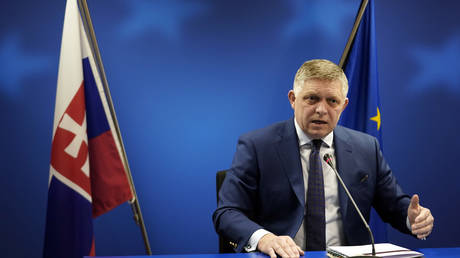
Slovakia wants its concerns about Russian energy resolved before voting on the new package of restrictions, Robert Fico has said
Slovakia will block the EU’s 18th sanctions package against Russia unless Brussels resolves its concerns over the planned phase-out of Russian energy, Prime Minister Robert Fico has announced. Although the energy measures are set to be presented as trade legislation – thus needing only a qualified majority for approval – Fico argues that they relate to sanctions and should be treated as such.
The issue stems from the European Commission’s RePowerEU plan, which aims to eliminate all Russian energy imports by 2028. The initiative is due to be discussed at the EU Foreign Affairs Council in Brussels, alongside the new sanctions package, which mostly targets Russia’s energy and financial sectors. Fico has insisted the measures against Russian energy actually fall under the bloc’s sanctions regime and should be unanimously approved. Fico said Slovakia will request a postponement of the vote and, if denied, will vote against it.
“As for tomorrow’s vote, Slovakia will not vote on the 18th sanctions package,” he stated at a parliamentary committee meeting on Thursday. “We consider it to be one package that includes RePowerEU, and we believe that unless the fundamental issues are resolved, we cannot adopt any further sanctions.”
He warned that the regulation would endanger Slovakia’s energy security and cause price hikes. He also noted that Brussels has yet to provide answers on how it would compensate for rising gas prices or handle potential arbitration with Gazprom. Fico warned that if Slovakia breaks its long-term supply contract with the Russian energy giant, it could face up to €20 billion ($23 billion) in penalties.
“Let’s take this seriously. Slovakia has gone from being a country at the beginning of the pipe to a country at the end of the pipe…There may be shortages, prices will go up… RePowerEU is harmful,” he said, calling the initiative “ideological nonsense.”
Hungary has also voiced opposition to the plan. Hungarian Foreign Minister Peter Szijjarto said Budapest and Bratislava had jointly blocked the package when it was discussed at the foreign ministers’ meeting earlier this week, warning that the proposed phase-out would “destroy Hungary’s energy security” and sharply raise utility costs. He signaled that Hungary also planned to vote against the new sanctions package.
READ MORE: Russia not main threat to EU – bloc member state
Moscow has repeatedly condemned sanctions as illegal and self-defeating, particularly those targeting energy, noting how energy prices in the EU surged after the initial measures against Russia were imposed in 2022. Commenting on the sanctions debates, Kremlin investment envoy Kirill Dmitriev praised Slovakia and Hungary on X for “doing what Brussels won’t: fighting to keep the EU globally competitive.”




